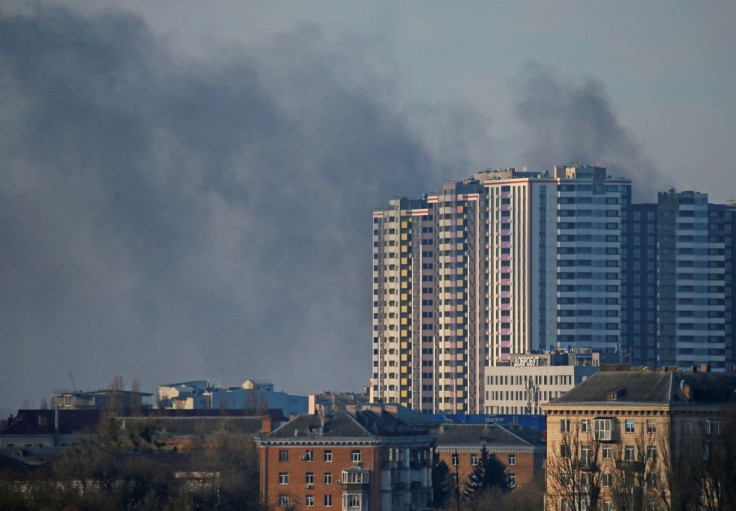Allies Sulk To Toe US Line On Russian Invasion of Ukraine

Choosing sides in the Ukraine crisis comes naturally to the U.S. allies like Saudi Arabia, India, and United Arab Emirates (UAE), but the robust ties with Russia forced them to strike a balance.
Russia chose to invade Ukraine when oil, gas, and coal markets are really tight, and Russia is a big exporter of all three. So, even if the invasion is costing Russia, it is making a lot of money from higher oil prices and there is no shortage of friends for it.
As the world rushed to condemn the Russian invasion of its neighbor, the wealthy Gulf U.S. allies and the QUAD member India and Brazil, Latin America's largest economy, largely kept quiet due to economic reasons and security ties.
The United Arab Emirates Feb. 27 again showed its reluctance to condemn the Russian invasion of Ukraine, as the conflict entered the fourth day.
The UAE "believes that taking sides would only lead to more violence," Anwar Gargash, diplomatic adviser to President Khalifa Bin Zayed Al-Nahyan, tweeted.
Hours before Russia unleashed a massive ground, sea, and air assault on Ukraine Feb. 24, the UAE "stressed the depth of friendship" with Russia.
On Feb 25, the UAE and India abstained from voting at the UN Security Council demanding Moscow withdraw its troops.
Gulf powerhouse Saudi Arabia has maintained a safe distance from the U.S. and did not react to the Russian invasion. Though Kuwait and Qatar denounced the violence, they stopped short of criticizing Russia.
For more than seven decades, the U.S. played a key role in defending the oil-rich Gulf monarchies against potential threats. After Washington started limiting its military presence in the region in 2016, allies like Saudi Arabia and the UAE, two U.S. allies hosting American troops, are re-thinking their strategy and are diversifying their alliances to compensate for the U.S. withdrawal from the region.
Already, the UAE and Saudi Arabia have become targets of external attacks. Yemen's Huthi rebels, backed by Iran, recently attacked the UAE and Saudi oil giant Aramco's facilities were hit in 2019 by the Iran-aligned insurgents.
Ties between the Gulf states and the U.S. have turned a love-hate relationship over arms deals and human rights issues.
The 2018 killing of Saudi journalist Jamal Khashoggi strained relations with Riyadh, and the UAE has threatened to cancel a mega-deal for U.S.-made F-35 jet fighters.
As security cooperation with Russia is growing, the Gulf states do not want to put their security eggs into the U.S. basket alone. Trade between Russia and the Gulf states, mostly with the UAE and Saudi Arabia, reached more than $5 billion in 2021 from around $3 billion in 2016, official figures show.
So despite calls by some major oil importers to boost supply and help stabilize the soaring prices, Saudi Arabia, the world's top exporter, has shown no interest to increase production. High oil prices also benefit Russia, which is the second-largest exporter.
As on the expected lines, China is rallying behind Russia. Russia-China relations increased after the U.S. and Europe imposed sanctions on Russia for its actions on Crimea. For the oil-rich Russia, China became a natural market and the supplies increased over the years. China is currently Russia's largest trading partner.
Based on their geographical locations and concerns, Russia's area of interest is Europe, while for China it is Asia. This makes supporting each other prudent.
The Russia-China alliance got a new entrant into their fold with the inclusion of Pakistan which is out of favor with the U.S. and deeply indebted to China. Pakistan Prime Minister Imran Khan became the first foreign leader to meet Putin after Russian troops entered eastern Ukraine.
Iran's proximity to Moscow is well established. To woo Iran to its fold, the U.S. has issued waivers in relation to Iran's civil nuclear facilities. Iran has a number of proxies in West Asia, which could flare up tensions in West Asia and can impact global oil supplies, and can limit the impact of U.S. sanctions on Russia. Despite the U.S. efforts to woo Iran to its fold with a waiver of sanctions, Iran has played neutral in the Ukraine crisis.
India was tepid in its response to Russia's aggression. India has called for de-escalation but did not condemn Moscow. New Delhi is part of the QUAD along with the U.S., Japan, and Australia, which is aimed at curbing Chinese influence in the Indo-Pacific region.
Brazilian President Jair Bolsonaro has declined to condemn Russia's invasion. Bolsonaro, a far-right populist, recently snubbed U.S. entreaties not to visit Moscow.
Syria's government has expressed support for Russia as Russia has been a crucial ally of Syrian President Bashar al-Assad since the civil war erupted in 2011.
Venezuela has emerged as an important ally for Russia from the Latin American region. Cuba, a close ally of Russia, will support Russian actions. Armenia, Kazakhstan, Kyrgyzstan, Tajikistan, Azerbaijan, and Belarus once a part of the Soviet Union are falling behind Russia.
As the U.S. is planning to carry a resolution to the full 193-member UN General Assembly soon, the world can know how many takers are there for the project 'isolate Russia.' It may happen on March 2.





